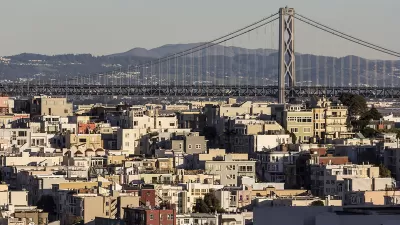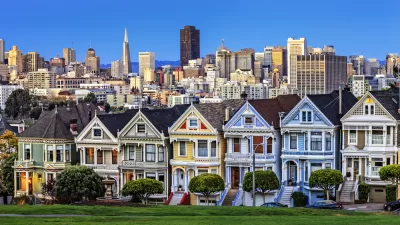Robert Selna, a land use and real estate attorney, pens a letter to the editor arguing for Oakland to develop specific and aggressive housing development policies.

Selna's premise: that "Oakland offers the best opportunity in the Bay Area for building much needed housing and for building it right - so that it is affordable to middle- and low-income residents."
But while there's some good news about Oakland's current efforts, there are also some reasons to ask for more from policy makers. "The good news is that the City of Oakland is starting to implement smart-housing policies as development economics are reaching a point where it makes sense for investors, lenders and developers to choose Oakland over other options. Meanwhile, several affordable housing projects developed by nonprofits are under way."
On the other hand, "so far, only one candidate for mayor in the coming November election - Mayor Jean Quan - has listed housing construction as a top priority. Even so, her plan is so vague as to be meaningless."
As for recent policy changes, and what's left to be done, according to Selna: "The city's newly created area-specific plans (see box) are a great start. They give developers details: where and how high they can build housing, the allowed commercial uses, and architectural design guidelines."
The article then goes on to list a few suggested modifications of the planning code and permitting process to further encourage development.
FULL STORY: Oakland's promise as solution to Bay Area's housing crunch

Alabama: Trump Terminates Settlements for Black Communities Harmed By Raw Sewage
Trump deemed the landmark civil rights agreement “illegal DEI and environmental justice policy.”

Planetizen Federal Action Tracker
A weekly monitor of how Trump’s orders and actions are impacting planners and planning in America.

The 120 Year Old Tiny Home Villages That Sheltered San Francisco’s Earthquake Refugees
More than a century ago, San Francisco mobilized to house thousands of residents displaced by the 1906 earthquake. Could their strategy offer a model for the present?

Opinion: California’s SB 79 Would Improve Housing Affordability and Transit Access
A proposed bill would legalize transit-oriented development statewide.

Record Temperatures Prompt Push for Environmental Justice Bills
Nevada legislators are proposing laws that would mandate heat mitigation measures to protect residents from the impacts of extreme heat.

Downtown Pittsburgh Set to Gain 1,300 New Housing Units
Pittsburgh’s office buildings, many of which date back to the early 20th century, are prime candidates for conversion to housing.
Urban Design for Planners 1: Software Tools
This six-course series explores essential urban design concepts using open source software and equips planners with the tools they need to participate fully in the urban design process.
Planning for Universal Design
Learn the tools for implementing Universal Design in planning regulations.
Clanton & Associates, Inc.
Jessamine County Fiscal Court
Institute for Housing and Urban Development Studies (IHS)
City of Grandview
Harvard GSD Executive Education
Toledo-Lucas County Plan Commissions
Salt Lake City
NYU Wagner Graduate School of Public Service





























